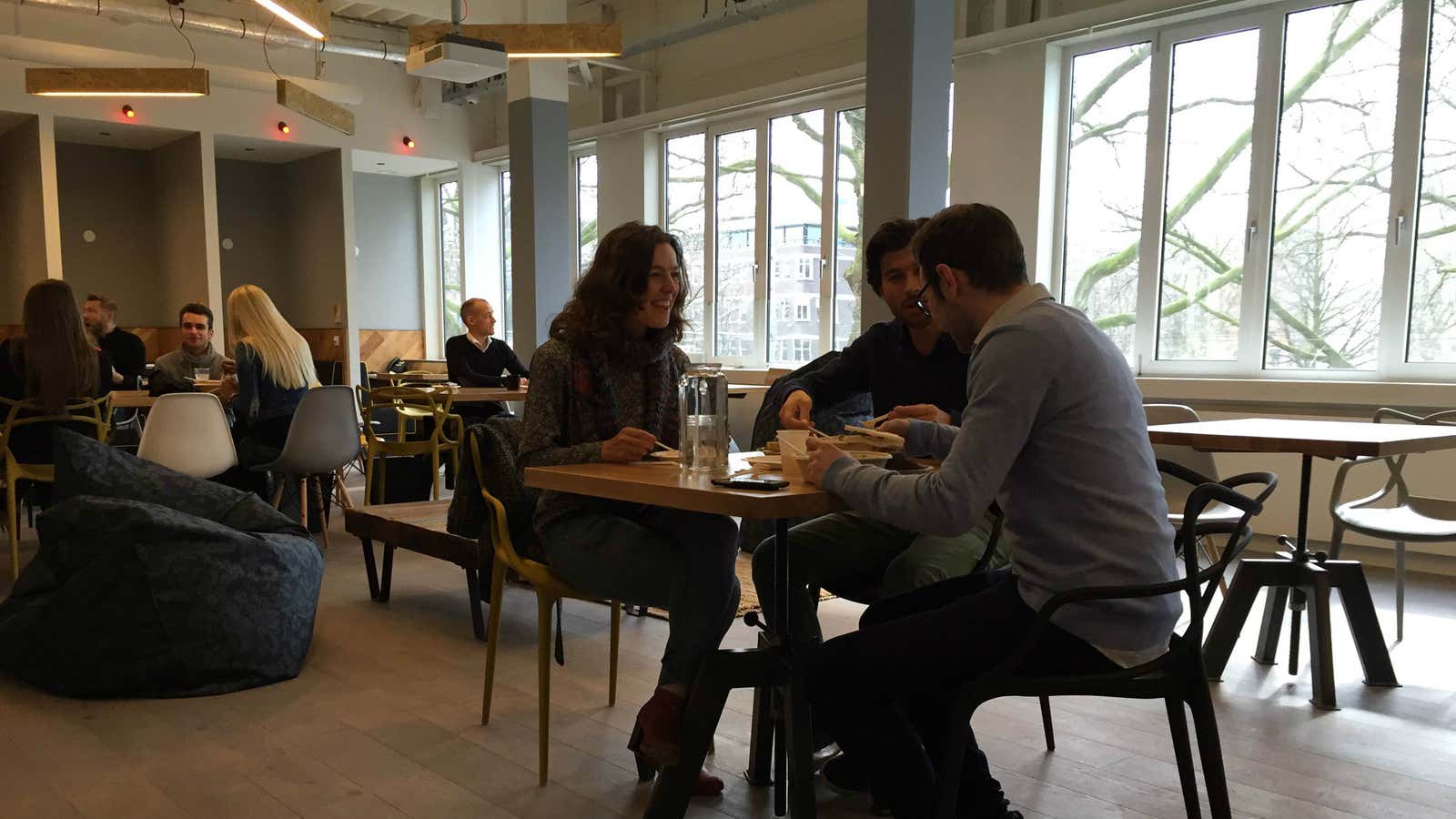Stephan van den Brink, a freelance art director, just exchanged his desk at an old school building for a desk at WeWork Amsterdam. It’s the newest location of US coworking space provider WeWork, where young professionals sprawl out on beanbag chairs, sipping micro-roasted coffee or lemon- and orange-flavored water. Why did Van den Brink move offices? “It’s so clean, all the equipment is in good state and monthly fees are all-in[clusive],” the hoody-wearing, stubble-flecked designer says.
Indeed, there are no extra costs to use the laser printer or make domestic phone calls. There’s even a bar with unlimited free beer that Van den Brink admits, is what ultimately pushed him over the line.
Like Van den Brink, I recently moved into the swanky coworking space. It only took a lunch for me to make up my mind. WeWork gives you the feeling that you’re part of an office culture. The moment you walk in, you sense the future of work is being shaped here. At 10am there’s a line at the coffee machine. At the end of the day, members occasionally gather for free drinks in the WeWork lounge. In between, people work—just like at a large corporation, but everyone is extremely passionate about what they’re working on, and why they’re doing it. There’s a team working on launching a Google for lost and found, a guy creating a platform to rent a private hairdresser, and a team building a data platform to facilitate campaigns for ad-tech companies.
Officially open since April 1, the space is already at 70% capacity with 265 members. In New York, demand is even higher, with some on the waiting list for two years.
Membership fees in the US range from $45 per month for a virtual membership, which includes access to a 23,000-plus member network and to conference rooms, to fees starting at $350 per month for a physical desk. (As a comparison: a shared desk in Manhattan costs on average $349 per month. Costs for such a desk outside of Manhattan are $229, according to Alleywatch.) Membership can be cancelled on a monthly basics, which gives startups needed flexibility.
WeWork members are drawn in by the community feeling, feeding well into the need for smaller startups and freelancers to belong to something. There’s a social network for members on which questions and opportunities are posted. Each week events are organized, ranging from weekly happy hours where entrepreneurs are likely to shake hands with a future app developer to free info sessions (“What to deal with when dealing with a Venture Capitalist fund?”) and themed network events, like “Women in Marketing.” In the US, a 4-day summer camp brings WeWork members together in Raquette Lake, in New York State.
WeWork recently raised $355 million in funding and they’re planning an IPO within the next two to three years. They leased about 1.6 million square feet in New York, making it the fastest expanding company by footprint in the city since 2010. The company plans to continue this rapid and disruptive expansion. By the end of 2015 it aims to lease around 3.5 million square-feet of office space worldwide and have 50 locations. It’s just four years old and valued at $5 billion.
The group refutes claims that it is a commercial real estate company. In a recent interview 35-year old Israeli founder Adam Neumann stated that WeWork is “a platform for creators” and “the sharing economy for space.” “We don’t have tenants but members,” he said, which indeed is the feeling working at WeWork gives. That you’re a member of a club of people all working on realizing their dreams while hanging out together, as opposed to just seeing that desk as the result of a rental agreement.
